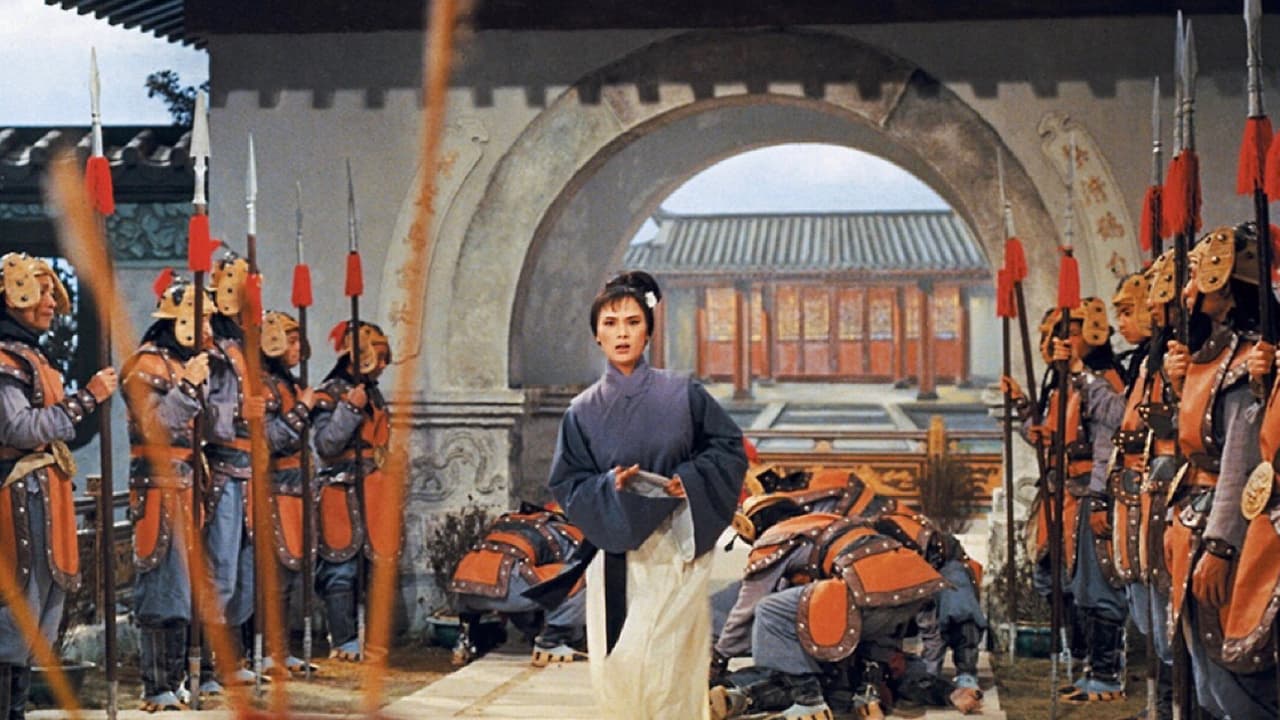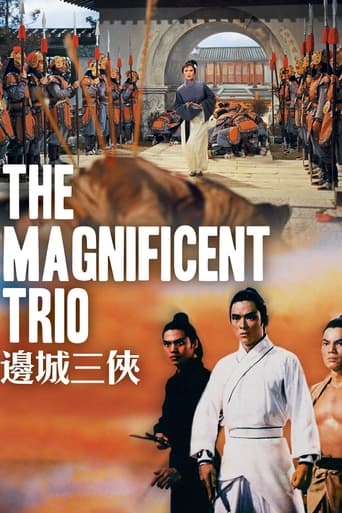poe426
Early entry in the kung fu canon, with an emphasis on swordplay and super heroics, THE MAGNIFICENT TRIO also boasts a bit of wirework. Everything is relatively low-key, most notably the sound effects, which is an interesting change of pace from the bone-crunching, over-the-top sound effects that would later come to distinguish the movies in this genre. It's great to see these movies as they were meant to be seen (and in their entirety); the eviscerated American versions of so many martial arts movies simply don't do them justice. Many of these movies have their own particular (oftentimes political) approach to storytelling and the incorporation, from time to time, of the supernatural or superhuman element(s). And, almost always, there are the heroes- men of upstanding virtue who are willing to sacrifice all for What Is Right- even if it means turning on their Evil masters (as Lo Lieh does here).
phillip-58
Not one of the best Shaw's productions but the Celestial DVD release is well done, though a few extras (apart from trailers) would have been nice. But always good to see Jimmy Wang Yu and Lo Lieh together and Cheng Lei has a good, if ultimately tragic, role. Heroic tragedy is a concept still alien to Hollywood (I suppose 300 comes closest) but very common in Asian films where it is considered a virtue. Anyway the fight scenes are a bit hack and slash and all done mainly with swords (no kung fu here). Jimmy Wang Yu almost shows some emotion at the end as he rides into the sunset leaving behind his love interest who for reasons not entirely clear (betraying her father I guess) has become a Buddhist Nun. A good film but not one of the best.
Brian Camp
THE MAGNIFICENT TRIO (1966) is a colorful Hong Kong swordplay film that stars Jimmy Wang Yu as an ex-soldier who bravely intervenes in a dispute between villagers and a corrupt magistrate. The swordplay is abundant, but staged in the slash-and-swing style, in which the heroes kill their opponents with one slash, while they themselves suffer repeated stabbings and arrow wounds yet keep fighting. It's not terribly realistic, but is exciting and beautifully photographed at the Shaw Bros. studio. The film is often cited as a Hong Kong version of the Japanese film THREE OUTLAW SAMURAI. It does indeed play like a Samurai film but is laced with the melodramatic flavor common to Hong Kong films of the time.In the course of the 108-minute film, Wang Yu arrives in town just after the villagers kidnap the magistrate's daughter and prepare a petition for visiting Minister Yuan alleging unjust taxation and exploitation by the magistrate. A deal is made and Wang Yu returns the daughter and offers to accept the punishment that would have been dished out to the three kidnappers. The magistrate breaks his word and the daughter, who has fallen for Wang Yu, has her maid help him escape. Usually cast as a loner, Wang Yu is joined here by two allies to form the trio of the title, first by his army buddy (Cheng Lei) and later by one of the magistrate's men (Lo Lieh), who sees the rightness of the villagers' cause. Eventually the trio takes on all the magistrate's guards in an effort to get the petition to the visiting minister.In addition to the three main actors, the cast includes familiar Shaw Bros. players such as Wu Ma, Tien Feng and Ku Feng, as well as three excellent actresses in key roles, Margaret Tu Chuan, Chin Ping and Fanny Fan. There is a very nice original music score, although there are no songs. If you're a fan of Wang Yu's other 1960s swordplay films--TWIN SWORDS, THE ASSASSIN, THE ONE-ARMED SWORDSMAN, TRAIL OF THE BROKEN BLADE, and RETURN OF THE ONE-ARMED SWORDSMAN, all made before Wang Yu became Hong Kong's first genuine kung fu star in THE Chinese BOXER--you'll like this one also. The VHS edition available in the U.S. is in Mandarin with English subtitles and cries out for letter-boxing, because the full-frame transfer cuts off the subtitles on the sides, making some dialogue difficult to decipher.ADDENDUM: In April 2003, Celestial Pictures/IVL released a Region 3 DVD offering a restored, remastered edition of this film as part of its new line of Shaw Bros. releases. It's letter-boxed and in Mandarin, with English subtitles.SECOND ADDENDUM (Sept. 24, 2015): I watched THREE OUTLAW SAMURAI and THE MAGNIFICENT TRIO back-to-back this week. The Hong Kong film is a pretty close remake, plotwise, but it places a greater emphasis on romance, with each of the three heroes forming romantic relationships and all showing much greater expression of their feelings than their samurai counterparts. There are five significant female characters in the Hong Kong film. The Japanese film, in black-and-white, is darker, grittier and a bit more realistic, while the Hong Kong film, in color and Shawscope, is more visually beautiful with brighter lighting, lavish sets, cleaner, more elegant costuming and a few spectacular location shots (probably filmed in Taiwan). The morality is more black-and-white in the Hong Kong film, with none of the shades of gray you find in the Japanese film. The heroes are more idealized. The Hong Kong film is simpler and less demanding, but more entertaining. It won't hurt you to watch both versions.

